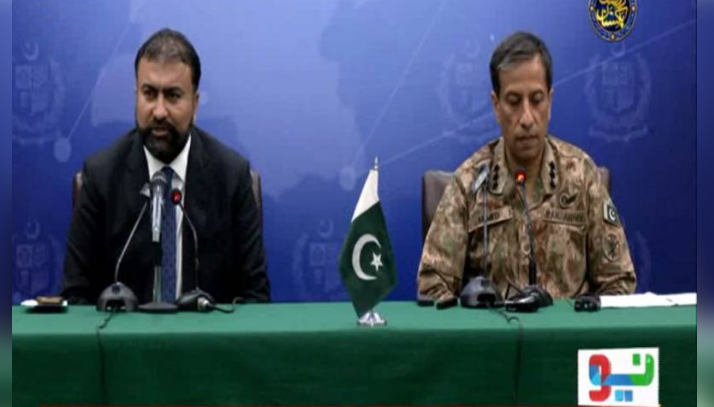Islamabad (Web Desk): Director General (DG) Inter-Services Public Relations (ISPR) Lieutenant General Ahmed Sharif Chaudhry, while briefing the media on Jaffar Express hijacking, said that India was the main sponsor of terrorism in Balochistan.
Addressing the presser alongside Balochistan Chief Minister Sarfraz Bugti, the DG ISPR shared critical details about the deadly hijacking incident and the response from Pakistan's security forces.
Lt Gen Chaudhry highlighted that the terrorists involved in the train attack had used weapons from both India and Afghanistan.
He emphasized, "We must understand that in this terrorist incident in Balochistan, and others before, the main sponsor is your eastern neighbour (India)."
The DG ISPR criticised Indian media for spreading misleading information about the incident. "The Indian media displayed fake footage of the incident to spread propaganda," he said, pointing to video clips that supported his claims.
"They attempted to create a narrative by sharing AI-generated images and fake videos. They were leading an informational warfare."
Lt Gen Chaudhry said that a coordinated effort was being made to legitimize the terrorists and their narrative.
He presented various clips of Indian officials discussing efforts to destabilize Balochistan, labeling the Jaffar Express attack as "a continuation of the same policy."
Recalling the details of the train attack, he stated that the terrorists had intentionally chosen a remote location, which made access extremely difficult and had no mobile signal.
He further said that Before the ambush, a group of terrorists attacked a Frontier Corps picket, martyred three soldiers, and then positioned themselves strategically to disable the train with an improvised explosive device (IED).
"They took the passengers hostage," he explained, adding that some passengers were segregated based on their ethnicity. This was seen as a logistical move by the attackers, as controlling the entire group of passengers would have been challenging.
He also noted that the terrorists' attempt to create a "false impression" of humanitarian values, claiming they had released some hostages, was a mere tactic.
When asked whether the attack could be considered an intelligence failure, the DG ISPR responded by emphasizing the challenges of intelligence work in Balochistan.
He argued that, "Balochistan presents a very challenging intelligence environment," but insisted that intelligence agencies were working relentlessly to identify leads and prevent attacks.
"I don’t agree with the term ‘intelligence failure’ because behind this are thousands of intelligence successes you don’t hear about—the incidents that never happened because our intelligence was able to successfully detect and neutralize them," he remarked, urging against labeling the incident as an intelligence failure.
The DG ISPR provided updated figures regarding the incident, noting that 33 terrorists were killed and the number of martyred passengers had increased from 21 to 26. He also revealed that 354 passengers were successfully rescued, bringing the total number of passengers to 380.
In addressing the broader rise in terrorism, he highlighted the National Action Plan’s implementation, citing that 59,775 intelligence-based operations (IBOs) had been carried out in 2024, with 11,654 IBOs already conducted in 2025.
He mentioned that, on average, 180 IBOs were carried out each day, and around 1,250 terrorists had been killed during 2024 and 2025.
However, he also acknowledged that 563 security personnel had been martyred in the line of duty.
Speaking during the briefing, CM Bugti reiterated that Pakistan was in an intelligence-driven war against external agencies, particularly India’s RAW and hostile Afghan elements.
"We’re in an intelligence-driven war waged against the state of Pakistan by RAW and other hostile agencies through Afghanistan especially because Afghan soil is being used against us," he said.
He condemned the attack on unarmed civilians, referring to the perpetrators as "terrorists," and dismissed any notion that their actions could be justified.
The Balochistan CM also criticized the past "appeasement" policies of previous governments toward terrorist groups, which he argued allowed key figures to be released and regroup for further attacks.
Bugti expressed confidence in the capacity and capability of the security forces to "handle this mess very soon," asserting that such surges in terrorist activity were not new and could be contained.
When questioned about a possible connection between the attack and the issue of missing persons, CM Bugti referred to it as a "dicey subject" that had been debated for a long time.
He clarified, "It is dicey because the count itself is unclear. I don’t want to justify anything—if even one person is missing, there is no justification. But there is a major difference between enforced disappearance and self-disappearance."
The DG ISPR, when asked about his earlier comments on changing the "rules of the game," stated, "They (terrorists) will be dealt in the way a person needs to be dealt who pulls down innocent people from roads and buses and slaughters them. A group that divides people on the basis of their ethnicity, has no link to Baloch or Islam. We will deal with them exactly as they deserve. We will take them on, their facilitators and abettors inside and outside Pakistan."
On Tuesday, banned outfit Baloch Liberation Army (BLA) launched a violent attack on the Jaffar Express, disrupting the train service by detonating explosives on the tracks. The attackers managed to seize control of the train, taking around 440 passengers hostage in a remote mountainous area of Bolan district.
The security forces intervened, carrying out a rescue operation to free the passengers and regain control of the situation.
By the time the operation concluded, the security forces had neutralized 33 militants.
Tragically, before the military action, the attackers had killed 21 passengers. Additionally, four security personnel lost their lives in the course of the operation.


